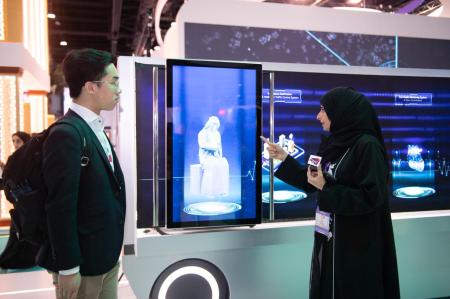The Ministry of Health and Prevention (MoHAP) has launched an AI-powered preventive healthcare platform dubbed “Enayati” to monitor health indicators and predict any possible health risks that may put patients’ lives at risk.
The platform includes a set of smart systems, applications and devices that are linked through sensors to the body of cardiac patients or those suffering from health symptoms or genetic diseases. The sensors monitor health indicators and send alerts to healthcare providers when any serious imbalance occurs.
The platform was unveiled in cooperation with the UAE Government Leaders Program at the 45th Arab Health being held at Dubai World Trade Centre from January 27 to 30.
Patients with chronic diseases, pregnant women, people of determination, and police and army staff in addition to workers will be the most to gain from the platform’s smart systems and applications.
100% artificial intelligence
HE Awad Al-Ketbi, Assistant Undersecretary of MoHAP’s Support Services Sector, highlighted that the launch of Enayati platform comes in line with the National Agenda 2021, aimed at improving the UAE’s health sector while focusing on the preventive aspect and avoiding health issues before they develop.
Al-Ketbi affirmed that the platform will benefit the vast majority of the society, especially those suffering from chronic or life-threatening diseases. The artificial intelligence-powered platform was designed in implementation of the UAE government’s directives to employ artificial intelligence in health services by 100%, enhance health prevention in the UAE society and improve public health, in addition to ensuring the happiness of the community.
Smart Bracelet
For his part, Ali Alajmi, Director of Health Information Systems Department, said that the innovative platform monitors reactions and receive notifications on the health indicators, using wearable devices that respond to abnormal health rates.
“Patients have to log in to the platform on daily basis to monitor his/her health condition. Data will be also stored in the ministry’s database and is to be taken into consideration when formulating health initiatives, strategies, and drawing up future health policies,” Alajmi added.
“In cases of life-threatening risk, wearable devices like smart bracelets evaluate the patient’s health indicators every second, and automatically send results to specialists, without having to contact paramedics for help. The smart bracelet shows vital health indicators, and identify the patient’s location (in case the medical team decided to rush to help the patient. All is according to the case being followed up).
Thanks to its continuous monitoring, the smart bracelet can detect any imbalances or early symptoms, which would help avoid infrequent health crises and their complications, he further said.




